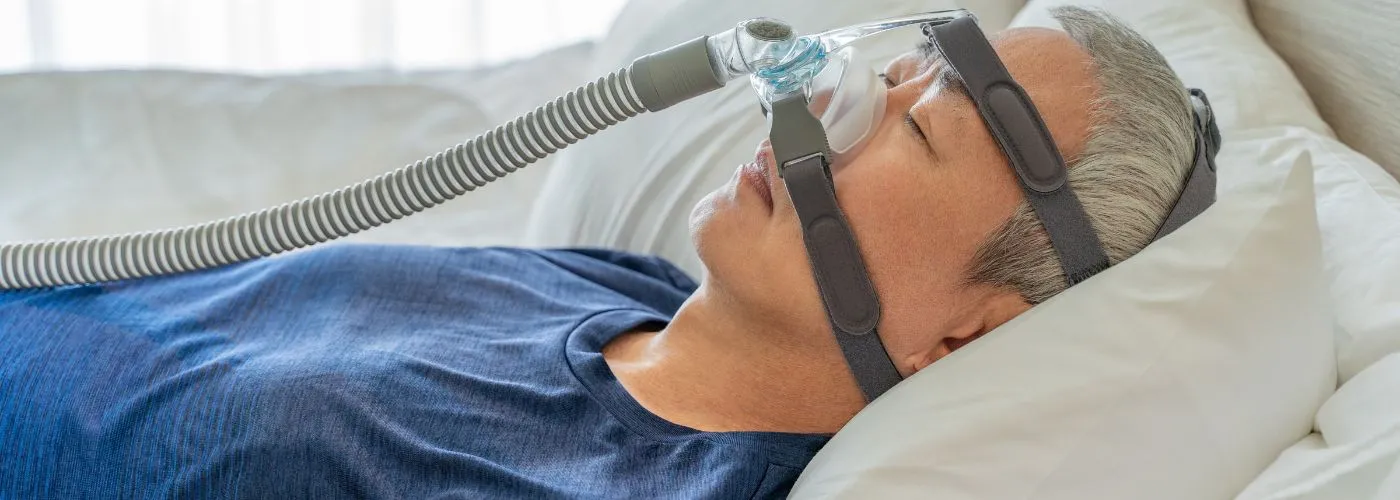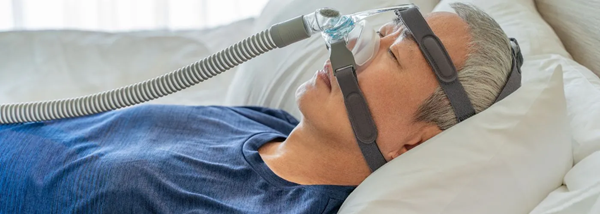Topics
Obstructive Sleep Apnoea (OSA) is a common yet serious sleep disorder where breathing repeatedly stops and starts during sleep due to airway blockage. This interruption, often accompanied by loud snoring or gasping, leads to poor sleep quality and oxygen deprivation. Despite being frequently underdiagnosed, OSA can significantly affect a person's daily functioning and long-term health.
People with OSA may wake up feeling unrefreshed, experience daytime drowsiness, and have difficulty concentrating. In severe cases, untreated OSA can lead to complications such as cardiovascular problems, high blood pressure, and stroke. Fortunately, effective treatments and lifestyle adjustments can drastically improve sleep quality and reduce associated risks.
What Causes Sleep Apnoea?
OSA occurs when the muscles at the back of the throat relax excessively during sleep, causing the airway to narrow or collapse. This interruption blocks airflow, lowers blood oxygen levels, and causes the brain to wake the person briefly to restore normal breathing.
Relaxation of Throat Muscles
During sleep, the soft palate and tongue muscles may relax and obstruct the airway, preventing effective breathing.
Obesity
Excess fat deposits around the upper airway are a major contributing factor to airway obstruction, especially in people with a higher body mass index (BMI).
Enlarged Tonsils or Adenoids
In both children and adults, enlarged tonsils can narrow the airway and increase the risk of airway blockages during sleep.
Family History
Genetics can play a role. A naturally narrow throat or a family history of OSA may raise your risk.
Smoking and Alcohol Use
Smoking increases inflammation in the upper airways, while alcohol relaxes the muscles of the throat, both contributing to sleep apnoea.
Chronic Nasal Congestion
Consistent nasal blockage, due to allergies or anatomical abnormalities, may double the likelihood of developing OSA.
Will Sleep Apnoea Increase Risk of Health Complications?
Yes, if left untreated, OSA can cause a variety of serious health issues. Repeated breathing interruptions can stress the heart, impact mental health, and reduce the quality of life (Felson, 2024).
Daytime Fatigue and Poor Concentration
Sleep interruptions prevent the brain from reaching the deeper, restorative stages of sleep, leading to fatigue, poor memory, and increased risk of accidents.
High Blood Pressure
OSA causes sudden drops in blood oxygen, which increases blood pressure and strains the cardiovascular system.
Heart Disease and Stroke
OSA is linked to irregular heart rhythms (arrhythmias), coronary artery disease, heart failure, and stroke.
Type 2 Diabetes
OSA can contribute to insulin resistance and glucose intolerance, increasing the risk of developing type 2 diabetes.
Liver and Kidney Dysfunction
Untreated OSA may affect liver function and increase the risk of chronic kidney disease due to poor oxygenation during sleep.
Eye Problems
Studies have linked OSA to glaucoma and other eye conditions, though these are often treatable once diagnosed.
Surgery Risks
OSA can cause complications under anaesthesia, especially during procedures that involve lying on the back or using sedatives.
Depression and Mood Disorders
Persistent sleep deprivation may lead to mood swings, anxiety, or even depression.
What Are the Treatments for Sleep Apnoea?
OSA is treatable with a range of non-invasive and surgical interventions. The choice of treatment depends on the severity of the condition and individual preferences.
Continuous Positive Airway Pressure (CPAP)
A CPAP machine delivers air pressure through a mask, keeping the airway open during sleep and reducing apnoea episodes.
Oral Appliances
Custom-made mouthpieces can reposition the jaw and tongue to help keep the airway open.
Lifestyle Changes
Weight loss, smoking cessation, and reduced alcohol intake can significantly reduce or eliminate symptoms of mild to moderate OSA.
Positional Therapy
Some people experience OSA mainly when sleeping on their back. Sleeping on one’s side can help keep the airway open.
Surgery
Procedures like Uvulopalatopharyngoplasty (UPPP), tonsil removal, or jaw surgery may be necessary in severe cases or when other treatments fail.
Nasal Devices
Nasal dilators or sprays may be used to improve airflow in those with chronic nasal congestion.
Frequently Asked Questions (FAQ)
1. How do I know if I have obstructive sleep apnoea?
Common signs include loud snoring, waking up gasping, excessive daytime sleepiness, morning headaches, and mood swings. A sleep study can confirm the diagnosis.
2. Is sleep apnoea dangerous?
Yes. Untreated OSA can increase the risk of high blood pressure, heart attack, stroke, diabetes, and even sudden cardiac death in severe cases.
3. Can children get obstructive sleep apnoea?
Yes. Children with enlarged tonsils or adenoids, nasal congestion, or obesity may develop OSA. It often presents as restless sleep or behavioural issues during the day.
4. Do I have to use a CPAP machine forever?
Not necessarily. Some people improve with weight loss, surgery, or lifestyle changes and may no longer need CPAP. Treatment plans are personalised and may evolve.
5. What if I cannot tolerate the CPAP machine?
If CPAP feels uncomfortable, your doctor may adjust the settings, provide a different mask, or explore alternatives such as oral appliances or surgery.
Book an Appointment at Pantai Hospitals
Obstructive Sleep Apnoea is more than just snoring—it’s a serious health condition that can silently impact your quality of life and long-term well-being. By interfering with your breathing and reducing oxygen levels, OSA can contribute to high blood pressure, heart disease, cognitive problems, and even accidents caused by fatigue.
At Pantai Hospitals, our team is committed to helping you understand, diagnose, and manage sleep disorders like obstructive sleep apnoea. We provide comprehensive sleep studies, tailored treatment plans, and ongoing support to help you sleep better and live healthier.
Do not wait—book your appointment today and start your journey toward better sleep. Our team is here to support you every step of the way. You may also book an appointment via our website or download the MyHealth360 application from the Google Play Store or Apple App Store.
Pantai Hospitals have been accredited by the Malaysian Society for Quality in Health (MSQH) for its commitment to patient safety and service quality.








